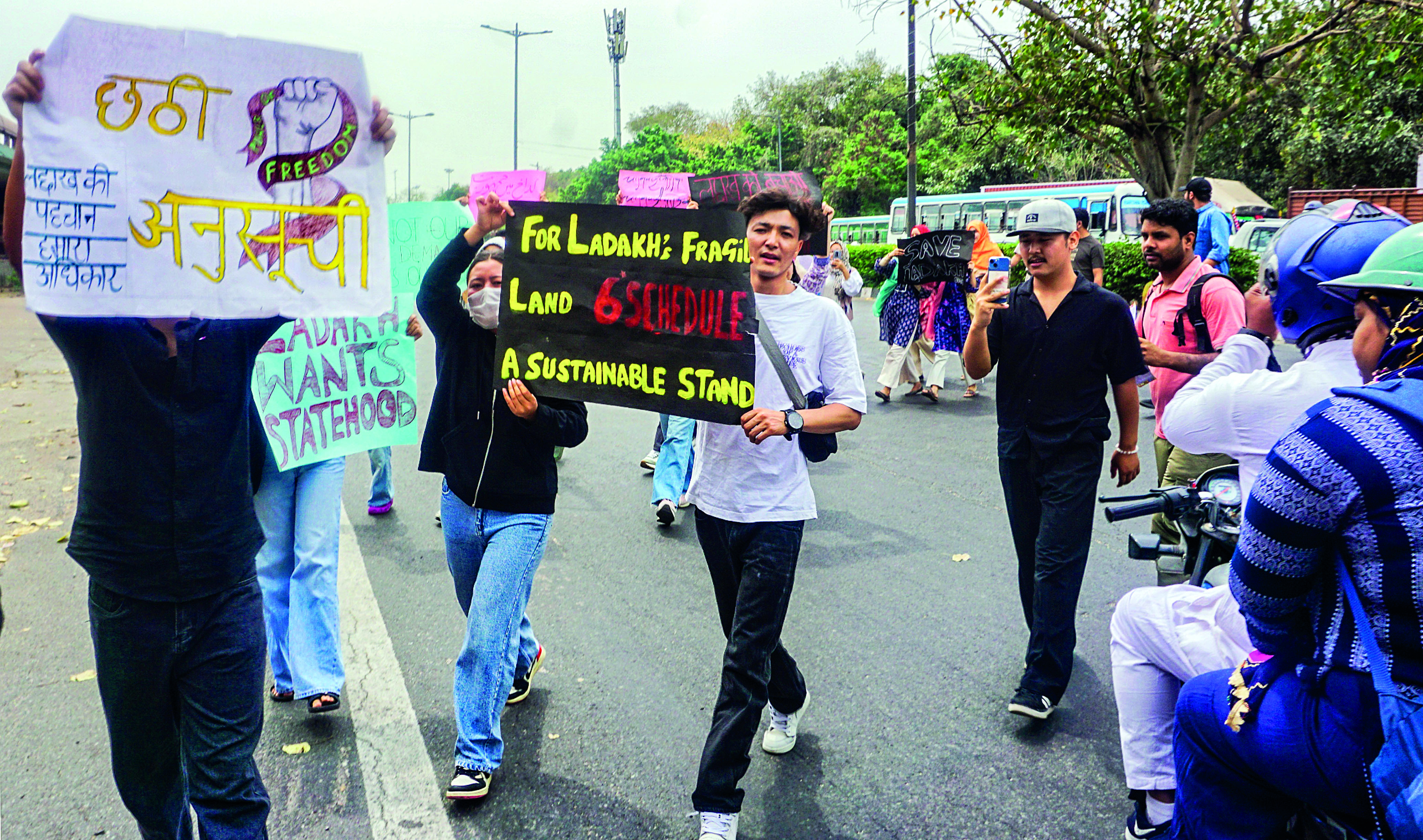Falling on deaf ears?
Although Sonam Wangchuk’s 21-day climate fast concluded without due media coverage, a strong voice against non-judicious and perilous exploitation of natural resources in the fragile Ladakh has been registered — demanding an enlightened response from the government and prompting people to act as an ‘ant army’ to preserve the serenity and wealth of their region

In the rugged terrain of Ladakh, where the icy winds whisper tales of resilience and the majestic Himalayas stand sentinel to a fragile ecosystem, emerges a voice that reverberates across the nation. Sonam Wangchuk, renowned education reformist and climate activist, has become the epitome of courage, undertaking a 21-day fast in the cold, akin to the legendary endeavours of Mahatma Gandhi during the British Raj. His unwavering resolve amidst temperatures plunging to minus-12 degrees at night is not merely a personal sacrifice but a clarion call for action, drawing hundreds of Ladakhis to fast alongside him in a bid to confront the harrowing destruction of their homeland.
Wangchuk’s fast serves as a poignant reminder of the imminent peril facing one of the world’s most delicate ecosystems. Ladakh, with its pristine landscapes and unique biodiversity, stands at the forefront of environmental degradation, as traditional grazing areas are transformed into ‘buffer zones’ to appease foreign demands. The plight of Ladakh resonates deeply with millions of Indians who witness the unchecked mutation of their cities into concrete jungles, yearning for a voice to articulate their concerns.
Amidst the cacophony of modernity, Wangchuk’s voice cuts through the din, striking a chord of truth and urgency. While mainstream media may falter in its coverage, the resonance of Wangchuk’s message transcends barriers, inspiring young activists in Indian cities to observe day-long fasts and mobilize on social media platforms. His advocacy serves as a beacon of hope for those yearning to challenge the status quo and champion the cause of ecological preservation.
Such is the chord Wangchuk has struck across the nation that the public at large believes he is speaking ‘the voice of truth’. Wangchuk plans, after completing his fast, to undertake a Border March accompanied by 10,000 Ladakhi shepherds and farmers right across the Changthang plains that are located on the border with China. Villagers have lost huge tracts of this pasture land to the Chinese presence, with traditional grazing areas having been turned into ‘buffer zones’ as the Chinese demanded during several rounds of talks to resolve the nearly four-year-long border standoff. The key issues Wangchuk is posing to the government and all of us should make us realise that it is imperative to review the present model of development, especially given the government’s desire to accelerate it.
The Ministry of Environment, Forests and Climate Change has been reduced to being little more than a rubber stamp and cornered into opening up our forests, our coastal zones, our deserts and, of course, our mountains to an unsustainable and unwanted development paradigm. We have to be grateful to Sonam Wangchuk for speaking out against this development paradigm and can only hope for a more enlightened response from the government. The BJP had promised implementation of the Sixth Schedule in their 2019 electoral manifesto but has since backtracked on this promise. Ladakhis now wonder whether they were given UT status without an Assembly as a deliberate ploy to sell off their mountains to industrial lobbies and mining companies.
In the face of daunting challenges, Wangchuk’s message resonates as a rallying cry for collective action. His metaphor of ‘an ant army’ underscores the transformative potential of united efforts in defence of our planet’s precious resources. Beyond individual protests and social media campaigns, there lies the power of grassroots mobilization and community engagement in shaping a more sustainable future.
Wangchuk’s potential Border March, accompanied by thousands of Ladakhi shepherds and farmers, exemplifies the strength of solidarity in confronting entrenched power structures and demanding accountability from policymakers. It is through such concerted efforts that meaningful change can be achieved, ensuring that the voices of marginalized communities are heard and their rights respected.
The ecological significance of Ladakh extends far beyond its borders, with implications reaching neighbouring countries and beyond. As the “Third Pole,” the Himalayas serve as a vital source of freshwater for over two billion people across the Indian subcontinent and China. Any degradation of this fragile ecosystem not only jeopardizes the livelihoods of local communities but also threatens the water security of entire regions.
The ongoing border standoff between India and China further underscores the need for responsible stewardship of shared natural resources. Wangchuk’s advocacy transcends national boundaries, highlighting the interconnectedness of environmental conservation and geopolitical stability. It serves as a poignant reminder that the preservation of our planet’s ecosystems is a collective responsibility that transcends political divides.
The apprehension of the average Ladakhi that their region may be opened up to large populations or increasing industrial activity is justified. Being in a cold desert, they are already facing acute water shortage, which would become worse if the landscape was opened up to more people. The central government also needs to consider the fact that the glaciers of Ladakh and the rest of the Himalayas feed two billion people, half on the Indian subcontinent and half on the Chinese side. The Ladakhis had welcomed the revocation of Article 370 and the bifurcation of the erstwhile state of Jammu & Kashmir, separating Ladakh as a Union Territory, following the assurance that the Ladakh Autonomous Hill Development Council would be empowered to take decisions. But they soon realised that power rested entirely with the Lieutenant-Governor and his hand-picked team of bureaucrats.
They are unhappy that power presently rests in the hands of ‘one person’, whereas earlier, they had their MLAs in the erstwhile J&K Assembly. The result is that even the budgetary allocation for Ladakh of Rs 6,000 crore remains largely unused, with half the money being returned to the exchequer because of the failure of the administrative machinery to utilise it. Wangchuk’s demands are simple. He wants statehood for Ladakh and Kargil and the inclusion of Ladakh in the Sixth Schedule of the Constitution as this alone will help safeguard its fragile ecology, unique culture, and traditional governance systems.
The political landscape of Ladakh adds another layer of complexity to the struggle for environmental justice. The revocation of Article 370 and the subsequent bifurcation of Jammu & Kashmir, separating Ladakh as a Union Territory, initially sparked hopes of greater autonomy and empowerment for the region. However, the reality proved starkly different as power remained concentrated in the hands of a centralized authority, leaving local voices unheard and aspirations unfulfilled.
The disillusionment among Ladakhis underscores the need for genuine empowerment and inclusive governance structures. Wangchuk’s advocacy for statehood and inclusion in the Sixth Schedule of the Constitution represents a pathway towards preserving Ladakh’s identity and ensuring that decisions affecting the region are made with the interests of its people at heart.
Economic development vs environmental conservation
The dichotomy between economic development and environmental conservation lies at the heart of the debate surrounding Ladakh’s future. While proponents of rapid growth tout the potential benefits of industrialization and infrastructure projects, the ecological cost cannot be ignored. The proposed Ladakh Industrial Land Allotment Policy 2023 and ambitious mega-projects threaten to irreversibly alter the region’s landscape, jeopardizing fragile ecosystems and traditional livelihoods.
The construction of a new airport in Leh, catering to two million tourists, raises concerns about the strain on local resources and infrastructure. Similarly, the push for a mega-solar project in the Changthang area poses a direct threat to nomadic pastoralists and the delicate balance of the region’s ecosystem. Wangchuk’s advocacy serves as a stark reminder of the urgent need to prioritize sustainability over short-term economic gains.
Wangchuk, who had been consuming only water and salt since he began his fast on March 6, broadcasted a fresh video message every day, which was posted on different social media platforms. These messages repeatedly focused on how the government has opened up the ‘sacred Himalayas’ for plunder and exploitation by corporations and mining companies. The people must stand up as ‘an ant army’ to defend these precious resources otherwise it is they who will ultimately pay the price for the destruction of their resources and ecology.
As Wangchuk’s fast concludes, the journey towards ecological preservation and sustainable development stretches before us, fraught with challenges yet brimming with hope. His advocacy serves as a clarion call for unity and action, urging the people to rise as ‘an ant army’ in defence of their precious resources and ecology. In the shadow of the Himalayas, where the fate of two billion people hangs in balance, the time for complacency has passed. Let us heed Wangchuk’s call and stand as guardians of our planet, stewards of our heritage, and architects of a future where nature and humanity thrive in harmony.
Views expressed are personal



